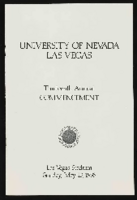Search the Special Collections and Archives Portal
Search Results
Tobias Mattstedt Menu Collection
Identifier
Abstract
The Tobias Mattstedt Menu Collection (approximately 1990-2009) is comprised of menus documenting the restaurant industry in Las Vegas, Nevada, the United States, and internationally. The menus include restaurants located in Las Vegas casinos, most notably the MGM Grand, located in Las Vegas. Included in the MGM Grand menus are restaurants such as the Pearl, Tabu Ultra Lounge, and the Grand Wok and Sushi Bar. The collection also documents menus collected by Mattstedt that are not affiliated with the MGM Corporation. These include menus located in the United States, especially Hawaii, including menus from the restaurants Olio!, Nob Hill, Diego's, and Sea Blue. The collection also includes international menus with a focus on Asian countries. The material provides insight into menu design, food culture, and the Las Vegas service industry.
Archival Collection
Beckley Family Photograph Collection
Identifier
Abstract
The Beckley Family Photograph Collection (approximately 1891-1982) consists of black-and-white photographic prints and negatives and color photographic slides. The images depict the Beckley family, their businesses in southern Nevada, and Las Vegas, Nevada as the city developed during the first half of the twentieth century. Also included are images of airplanes at the first Las Vegas airport Anderson Field, later renamed Rockwell Field in 1925, Fremont Street in Las Vegas, and postcards of mining towns across southern Nevada.
Archival Collection
University of Nevada, Las Vegas Office of the President Records
Identifier
Abstract
The University of Nevada, Las Vegas (UNLV) Office of the President Records is comprised of documents used in daily matters of the Office of the President from approximately 1950 to 2007. The records in the collection document the expansion of the UNLV campus, and the academic and athletics programs offered by the university.
Archival Collection
Michael McKensie Pratt Professional Papers
Identifier
Abstract
The Michael McKensie Pratt Professional Papers (approximately 1950-2021) contain costume designs, musical selections, and synopsis for shows that Pratt worked on in Las Vegas, Nevada including 90 Degrees & Rising, Les Folies Chic, and Jubilee!. The collection also contains souvenir show programs for cabaret shows performed in Paris, France and Las Vegas, Nevada, including
Archival Collection
Alpha Kappa Alpha Sorority, Incorporated, Theta Theta Omega Chapter Records
Identifier
Abstract
The Alpha Kappa Alpha Sorority, Incorporated, Theta Theta Omega (AKA TTO) Chapter records (1965-2020) are comprised of organizational records, conference programs, digitized copies of the chapter's scrapbooks, and copies of
Archival Collection

Danny Cluff oral history interview: transcript
Date
Archival Collection
Description
Oral history interview with Danny Cluff conducted by Claytee D. White on December 8, 2017 for the Remembering 1 October Oral History Project. In this interview, Danny Cluff discusses his attendance at the Route 91 Harvest music festival on the evening of the October 1, 2017 mass shooting in Las Vegas, Nevada with his friends and nephew. He talks of finding safety in Hooters with other survivors from the concert. When speaking of gun control, he discusses his perspectives on human nature, citing his experiences during and after the concert shooting. Throughout the interview, Cluff speaks of the ways he has healed and kept positive after the shooting, such as laughing through the hard times and writing poetry, of which he gives a few samples.
Text

University of Nevada, Las Vegas (UNLV) 13th commencement program
Date
Archival Collection
Description
Commencement program from University of Nevada, Las Vegas Commencement Programs and Graduation Lists (UA-00115).
Text

Sonny V. Mallari oral history interview: transcript
Date
Archival Collection
Description
Oral history interview with Sonny V. Mallari conducted by Chanele Mallari on November 26, 2021 for Reflections: The Las Vegas Asian American and Pacific Islander Oral History Project. Sonny Mallari talks about his childhood in Masantol, Pampanga province, Philippines with his five siblings. He discusses his family's immigration to Salinas, California and details of his life and parents' lives in the United States. Sonny shares stories of being bullied in school and what the immigration process was like from his point of view at the age of seven. He also talks about his professional work as a cook, moving to Las Vegas, Nevada for work, and becoming a Culinary Workers Union member.
Text

Meeting minutes for Consolidated Student Senate, University of Nevada, Las Vegas, March 20, 1975
Date
Archival Collection
Description
Text

Transcript of interview with Stanley Schwartz by Carol Schwartz, March 1, 1980
Date
Archival Collection
Description
Interview with Stanley Schwartz by Carol Schwartz on March 1, 1980. Stanley talks about coming to Las Vegas in 1951 to open a clothing business on Main Street, Schwartz Brothers Clothing. He compares the business district of the 1950s to the district in 1980, and advertising opportunities in the newspapers and on the radio. Schwartz talks about suit styles and changing preferences of buyers, and moving the store to Second Street, then Fremont Street, then to Maryland Square Shopping Center. In 1970, he changed the focus of the clothing store to "big and tall" and talks about the importance of customer service in retaining customers. He mentions Al Benedict and Herb Tobman as people he admired.
Text
